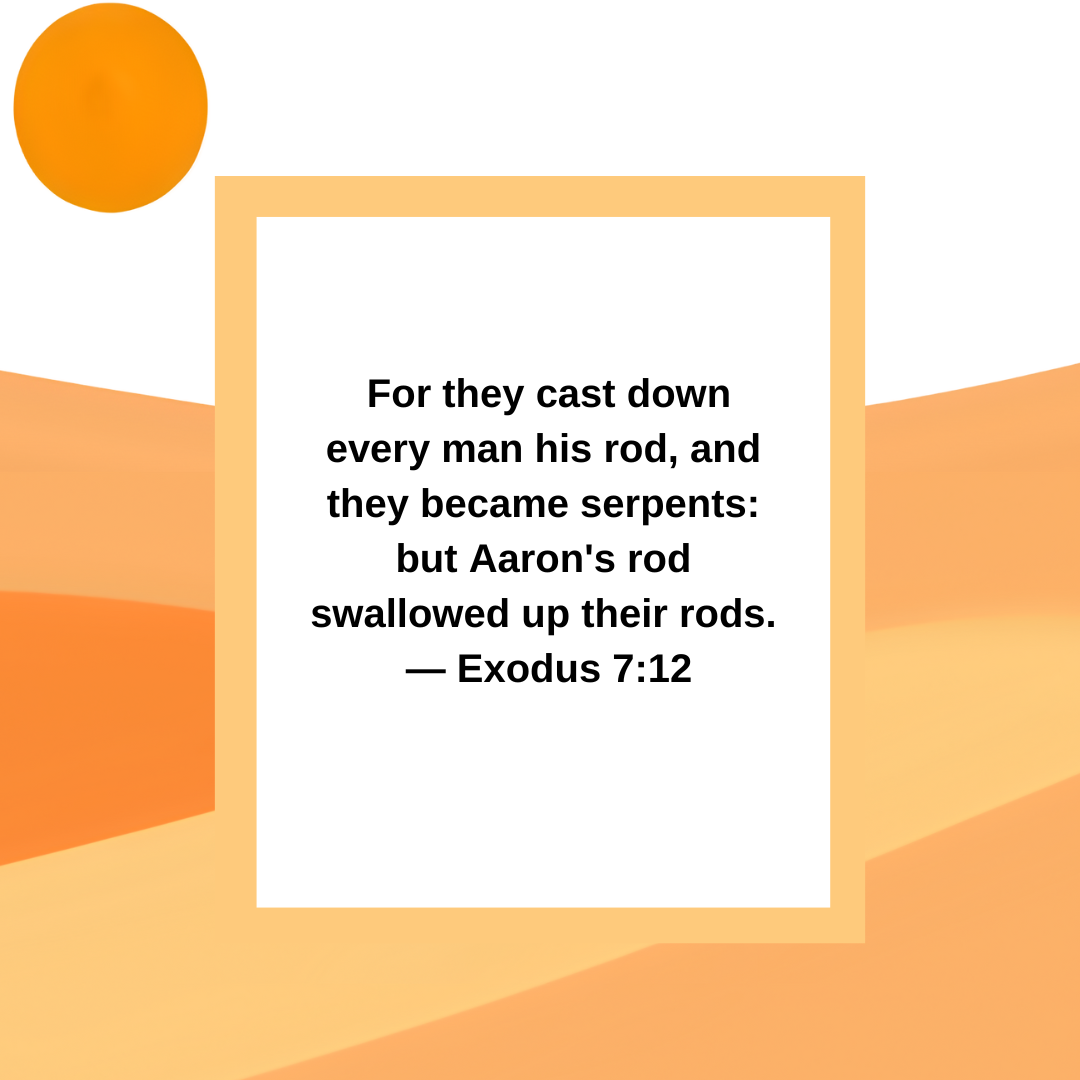Serpents, Signs & Sovereignty
And the Lord spake unto Moses and unto Aaron, saying, When Pharaoh shall speak unto you, saying, Shew a miracle for you: then thou shalt say unto Aaron, Take thy rod, and cast it before Pharaoh, and it shall become a serpent. And Moses and Aaron went in unto Pharaoh, and they did so as the Lord had commanded: and Aaron cast down his rod before Pharaoh, and before his servants, and it became a serpent. Then Pharaoh also called the wise men and the sorcerers: now the magicians of Egypt, they also did in like manner with their enchantments. For they cast down every man his rod, and they became serpents: but Aaron's rod swallowed up their rods. And he hardened Pharaoh's heart, that he hearkened not unto them; as the Lord had said.
Must Read Exodus all of 7:8–30
In the dust-filled courts of ancient Egypt, a confrontation far greater than politics or power begins to unfold. It is not just Moses versus Pharaoh. It is not simply about plagues and demands. This is God introducing Himself to a nation steeped in pride, magic, and manmade might. Exodus 7:8–30 pulls back the curtain on a spiritual standoff where signs are not just wonders but warnings. The question we must ask ourselves is not whether power exists, but whether that power is submitted to the Most High God.
The Lord instructs Moses and Aaron to perform a sign. Aaron throws down his rod before Pharaoh, and it becomes a serpent. To many, this might seem like a magic trick, but this was a divine declaration. Pharaoh's magicians imitate the act, but Aaron's rod swallows theirs. This single act is not just a miracle. It is a message. God is not competing; He is conquering. The spiritual principle here is profound: the enemy has power, but God has authority.
Pharaoh’s magicians mirrored the sign, proving that spiritual power can operate outside the will of God. This reality echoes in Romans 11:29, which reminds us that gifts and callings are without repentance. The magicians had skills, but their hearts were far from truth. Today, many still operate in gifts without submitting them to God. Talent is not always testimony. We must discern the source, not just the spectacle.
If the enemy can imitate power, how can you be sure what you're following is from God and not just a polished performance? Not every gift is godly. Just because it glows does not mean it’s glory. Test the source, not just the signs.
God tells Moses to meet Pharaoh at the Nile. As Pharaoh watches, Moses strikes the water, and it turns to blood. Fish die, the river reeks, and the Egyptians scramble for water. Yet Pharaoh’s heart remains hard. Why? Because the plagues were not just punishments; they were protests against false gods. Egypt worshipped the Nile. God turned it into a curse. Every plague attacks a lie. Worship is at stake.
We live in an age that loves spectacle—from social media trends to spiritual influencers. But not all signs are divine. Like Pharaoh’s magicians, some perform to impress, not to impact. Counterfeit power offers no peace. We must ask: Is what we follow glorifying God or feeding our egos? Gifts are not proof of intimacy with God. Surrender is. God is still asking us to lay down our rods so He can turn them into signs.
Though Pharaoh's heart was hardened, God continued to pursue His purpose. The swallowing of the serpents is symbolic of how truth will always overcome deception. God is not intimidated by magic, by pride, or by rebellion. His Word swallows lies. He is patient, but He is also just. Following God may not always be popular, but it is always powerful.
Exodus 7:8–30 reminds us that power without obedience is dangerous. The rod that swallows others belongs to the one submitted to God. In a world full of spiritual noise, choose the voice that speaks truth. Choose the God who calls you not just to show signs but to live submitted. Let this be the season you pick up your rod for purpose.

